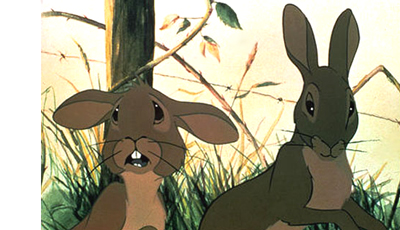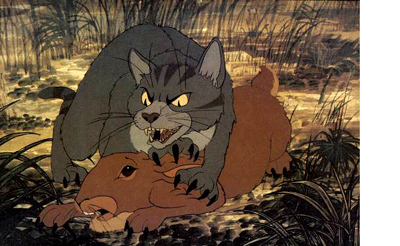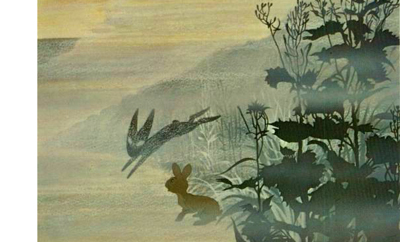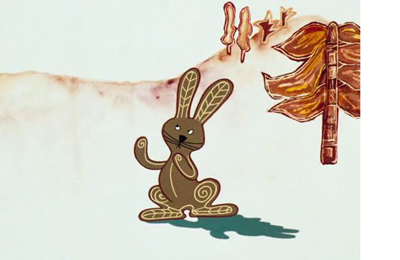
 |
|
|
|
when they catch you, they will kill you. But first they must catch you." Feature animation was in a real slump in the decade before the revival sparked by The Little Mermaid (1989). Disney offerings verged on the pitiful, and few producers approached the format with anything interesting in mind. Faithfully adapted from Richard Adams' serious adult bestseller, Watership Down dared to be different. Beautifully designed and animated, it made no concessions to the kiddie cartoon market. Its story of survival and bravery among rabbit warrens in the English countryside has more in common with Mad Max than Peter Rabbit. It's the harrowing tale of a few daring hares journeying in hopes of finding a home of their own. Watership Down had a good DVD release earlier from Warner Home Video. Criterion's edition tells even more of the story behind this beautiful picture. 
The hills are crowded with too many rabbits. Unhappy in his regimented warren, Hazel (voice: John Hurt) leads a group of similarly disenchanted rabbits in search of a new home. Fiver (voice: Richard Briers) foresees dangers but also locates a perfect hilltop. Their plans are threatened by a nearby warren more dictatorial than the one they left. Needing mates that only their enemies can provide, the rabbits prevail only through their wits and courage. Along the way they meet a number of helpful creatures, including a charming Russian seagull with bad pronunciation, who shouts his opinions. He's voiced by Zero Mostel: "Silly Bunnies - where are your mates? No mates, no eggs, no eggs, no chicks!" With its darkly rich watercolor background art, Watership Down creates a fascinating rabbit world. The creatures here are by no means cute bunnies - they're hopeful souls and hard-bitten veterans oppressed by the patriarchal dictatorship in their underground community. Prey for half of creation, the rabbit has only speed and cunning for defense. The story begins by proposing an interesting origin myth for a rabbit-centric universe, in which the rabbit species must forever atone for the original sin of pride. For this mystical sequence the animation style becomes simpler, more primitive. The Sun-God Frith looks almost Aztec in design. Although the story suggests humanity's struggle for basic security, Watership Down gets us interested in its heroes down on their level. Organized and militarized, the warren is policed by its aged leader's personal soldiers. Only a few elite males are allowed to mate, with the leader siring many of the offspring. Simple conversation can be interpreted as conspiratorial talk, punishable by expulsion to the deadly outside world. 
A significant amount of animated blood is spilled, as the rabbits are fierce and cruel fighters. In the very first scene prophet bunny Fiver has a vision of the sunset spreading a huge bloodstain across their meadow. The Night of the Lepus and Monty Python and the Holy Grail are kids' stuff by comparison: in this show You Will Believe a Bunny can Kill. Many an adult remembers being scared out of their socks by when they saw this show for the first time. Werner Herzog would approve of Watership Down. Nature is presented not as the Disney version but for what it is: wonderful, adventurous, but very dangerous. Being cute is no guarantee of survival. Characters are killed off or disappear into unknown fates with a naturalistic randomness not usually found in children's fare. An attempt to liberate some prospective female mates from a farm (these rabbits clearly have one-track minds) doesn't turn out at all well. Our group becomes entangled with a hostile neighboring warren that's even more brutal than the one they fled. They also find a third alternative warren that's too good to be true. The cautious Hazel learns its dark secret. Another sequence takes us totally by surprise. The passing of a main character summons from the deity myth a vision of the Black Rabbit of Death. Accompanied by the genuinely creepy pop song Bright Eyes (sung by Art Garfunkel), the Black Rabbit searches for a suffering soul to convey to the next life. The effect is quite jarring -- and certainly not appropriate for kids that haven't yet been introduced to the concept of death. They don't want to learn about it from this movie, any more than the brutally frank Bambi. 
The voices carry appropriate English accents, clearly enunciated -- subtitles aren't necessary. John Hurt, Ralph Richardson and Denholm Elliot are each recognizable, and assay their roles with precision. Zero Mostel is a lot less understandable, but very funny as the Russki seagull with sex advice for his furry friends. The animals exhibit a wide range of human qualities - warmth, courage, trust. It's refreshing to see an animated feature constructed from principles alien to the Disney worldview. There's a tendency to reach for an Animal Farm -- like analog for the show. But deep analysis isn't necessary. Watership Down is about nature, survival, life and death, as simple as that. Exciting, funny, suspenseful and unlike any animated feature ever made, Watership Down is a favorite around the Savant household. It so fascinated my youngest son when he was eleven years old, that he read the (rather thick) book from cover to cover, an important first literary experience. The Criterion Collection's Blu-ray of Watership Down is the expected flawless encoding of this impressive animation achievement. The colors are deep and rich in the handsome background artwork. The audio is forceful and sharp, with Angela Morley's music is rendered especially delicately. 
The extras show us what made the film so special -- in 1978 animated theatrical features weren't common, not even those made for children. Director Martin Rosen gives a full video interview in which we learn about the initial involvement of famous animator John Hubley. 1 We are also told that the artwork style for the mythical prologue was based on Australian Aboriginal art. Repurposed from the 2005 DVD, the featurette Defining a Style collects the remembrances of a number of animators and background artists. They all seem to have been eager to participate on such a promising project. Criterion's Blu-ray utilizes a picture-in-picture feature to present the storyboards for the entire film; the DVD chooses four sequences to compare. Disc producer Curtis Tsui embellishes the package with artwork from the prologue -- the disc itself bears the image of the Sun God Frith, and the Black Rabbit of Death is on the foldout insert sheet. Graphic novel writer Gerard Jones provides the insert essay. The film is NOT for small or impressionable children ... but kids old enough to understand its story without becoming emotionally distraught will cherish it.
On a scale of Excellent, Good, Fair, and Poor,
Watership Down Blu-ray Footnote: 1. We see just one still from the now-scarce John Hubley film Of Stars and Men (1954). I've never seen it but I found Harlow Shapley's book source to be highly controversial -- the astronomer-author quietly suggests that the reader consider the idea that it's time for mankind to shed the 'superstition' of faith in a God. I don't know how far the film carries that message, if at all. It was restored by the Museum of Modern Art in 2013, and screened in New York.

The version of this review on the Savant main site has additional images, footnotes and credits information, and may be updated and annotated with reader input and graphics.
Review Staff | About DVD Talk | Newsletter Subscribe | Join DVD Talk Forum |
| ||||||||||||||||||